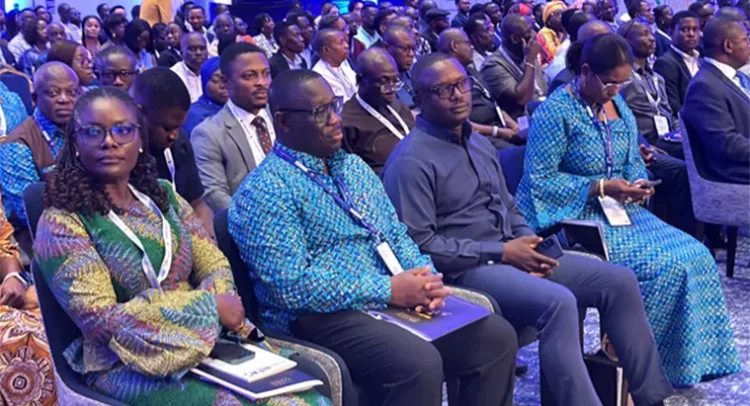Some dignitaries and participants
The Minister for Energy and Green Transition, John Abdulai Jinapor has lamented that the petroleum industry which was a catalyst for the country’s economic transformation now faces series of challenges.
He said, “An industry that has historically served as a significant source of government revenue, foreign direct investment, job creation and in-country value creation, is currently experiencing rapid decline in oil production.”
He mentioned some of the challenges as Regulatory inefficiencies and protracted licensing processes.
He also mentioned ambiguous and inconsistent policies, avoidable and unnecessary legal disputes over field unitisation.
“All these have collectively made Ghana less competitive relative to other hydrocarbon-producing nations in the region”, he added.
The Minister disclosed this at the opening of the 2025 Local Content Conference and Exhibition organised by the Petroleum Commission.
The three-day conference is on the theme, “Revitalising Ghana’s Petroleum Exploration and Production Sector: Driving Innovation and Redefining Local Content for a Competitive Energy Economy.”
It brought together major players in the industry both locally and internationally.
He revealed that between 2019, when the country’s crude oil production reached its peak, and 2025, output has declined sharply by about 32 per cent, dropping from 71.4 million barrels to 48.2 million barrels.
“This downward trend tells a sobering story. It signifies not only a reduction in government revenue but also a contraction in the value of opportunities and contracts available to Ghanaian companies,” he added.
He said, “These setbacks have far-reaching implications. They undermine Ghana’s fiscal stability and weaken the nation’s capacity to harness our hydrocarbon resources.”
The Minister added that he has therefore directed the Petroleum Commission to prepare an advisory paper on the issue.
“Let me assure you that government will not hesitate to terminate inactive petroleum agreements to ensure that our resources are utilised productively for the benefit of the Ghanaian people,” he revealed.
He said he has established a Legislative Review Committee to assess the current legal, regulatory, fiscal, and institutional framework of the upstream petroleum sector.
“The goal of this review is clear-to attract new exploration investments, encourage reinvestment by existing operators, and enhance recovery from producing fields,” he said.
In an address read on his behalf, the Western Regional Minister, Joseph Nelson noted that the country’s oil and gas sector has brought both opportunities and responsibilities to the region.
“That is why gatherings such as this are so critical. They provide the platform to reflect, evaluate, and renew our collective commitment to inclusive local content and sustainable regional growth,” he noted.
Acting CEO of Petroleum Commission Victoria Emeafa Hardcastle, called for increasing investments in the exploration and production and enhancing the level of local content and in-country value additions.
From Emmanuel Opoku, Takoradi


